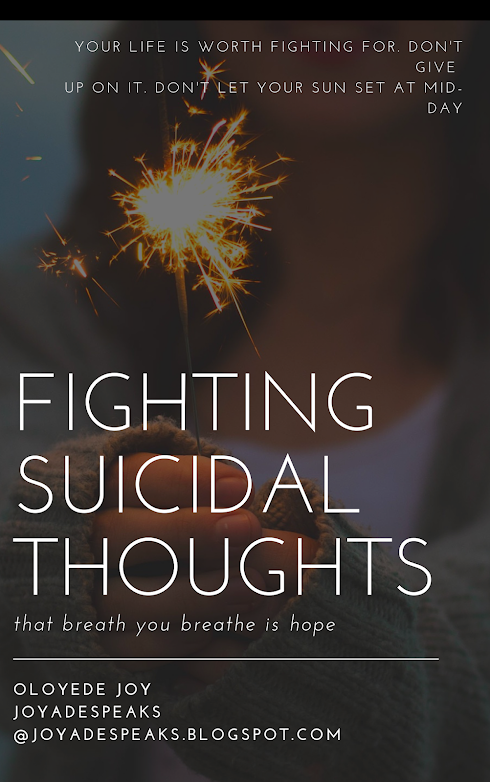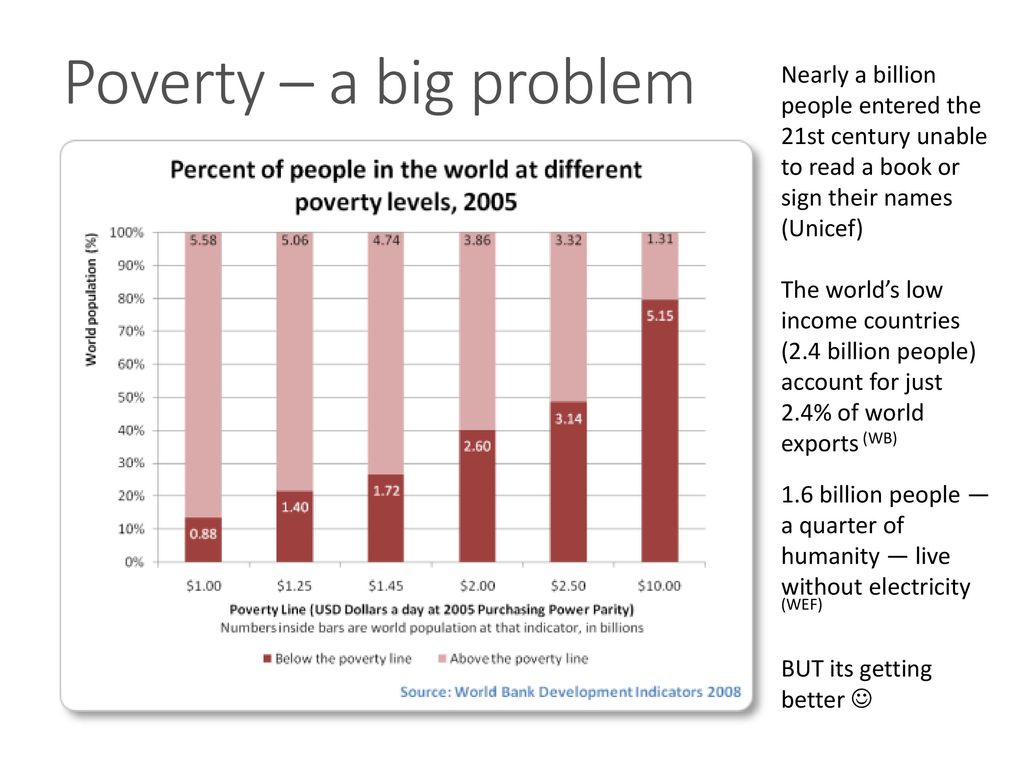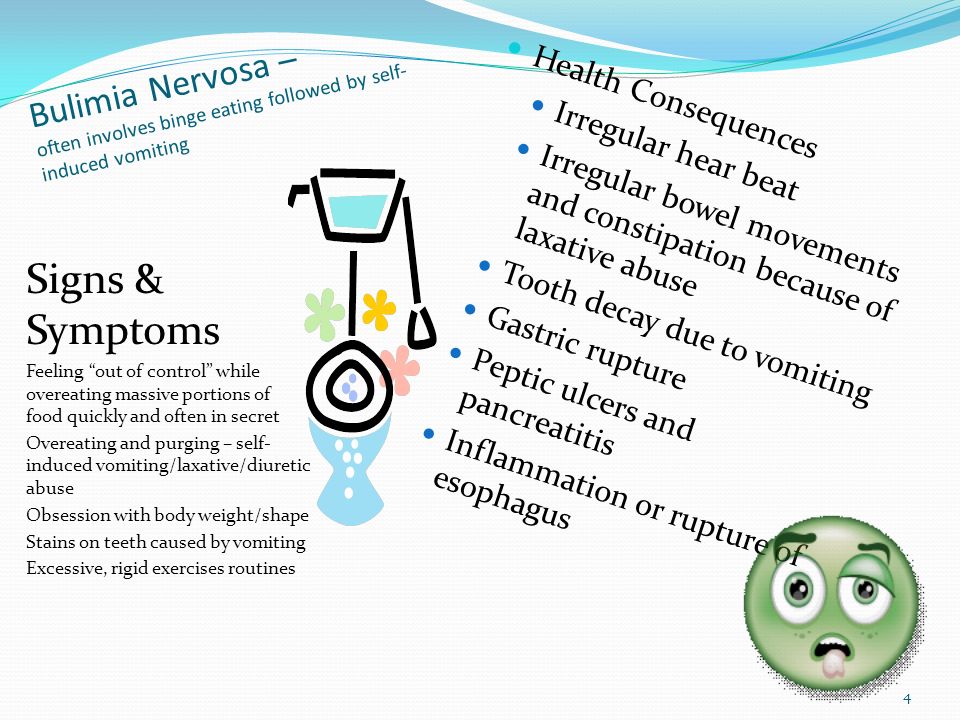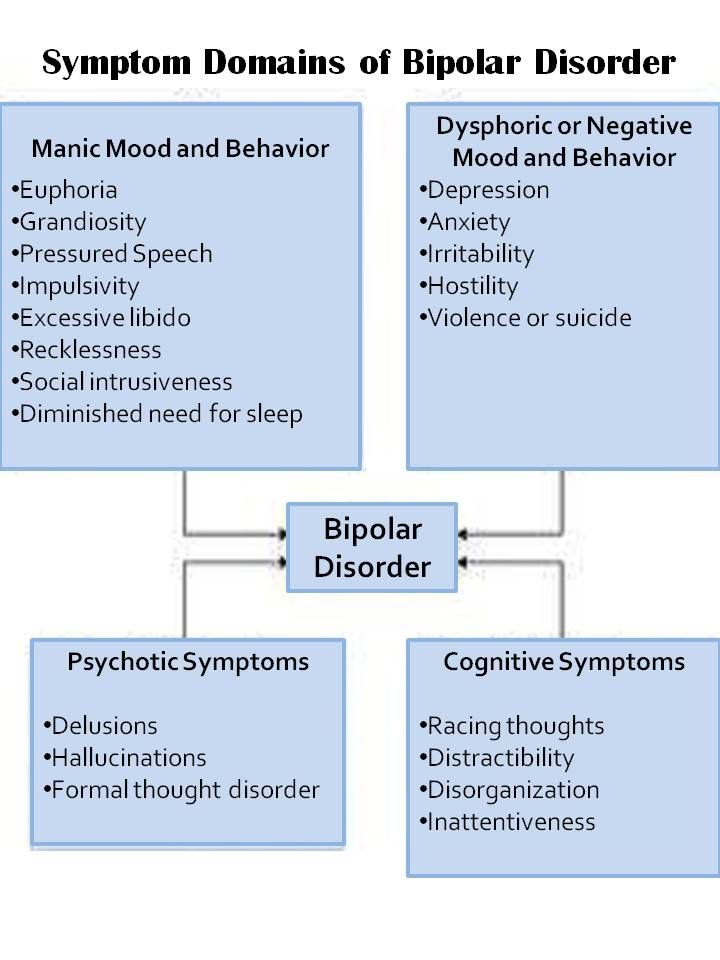Fight suicidal thoughts
How to cope with suicidal thoughts
This page may help you if you are dealing with suicidal thoughts. It has ideas you can try to help you through a crisis. It explains how you can stay safe and where you can go for support. This information is for adults in England who are experiencing suicidal thoughts, their loved ones and anyone interested in the subject.
If you would like more advice or information you can contact our Advice and Information Service by clicking here.
Download Suicidal thoughts - How to cope factsheet
- Overview
- Helping myself
- Emotional support
- Professional support
- Crisis plan & crisis box
- Further Reading
- Useful Contacts
Overview
- Just try to get through today rather than focusing on the future.
- Talk about how you are feeling with someone you trust or an emotional support helpline.
- Contact a health professional such as your GP or Community Mental Health Team (CMHT).
- Try to do activities you enjoy which take your mind off what you are thinking.
- If you are in real danger of taking your own life call emergency services on 999 or go to Accident and Emergency (A&E).
Need more advice?
If you need more advice or information you can contact our Advice and Information Service.
Contact us Contact us
Helping myself
How can I help myself now?
Don’t make a decision today
You don’t need to act on your thoughts right now.
Try to focus on just getting through today and not the rest of your life. You may have had these thoughts before, but you feel less able to cope today.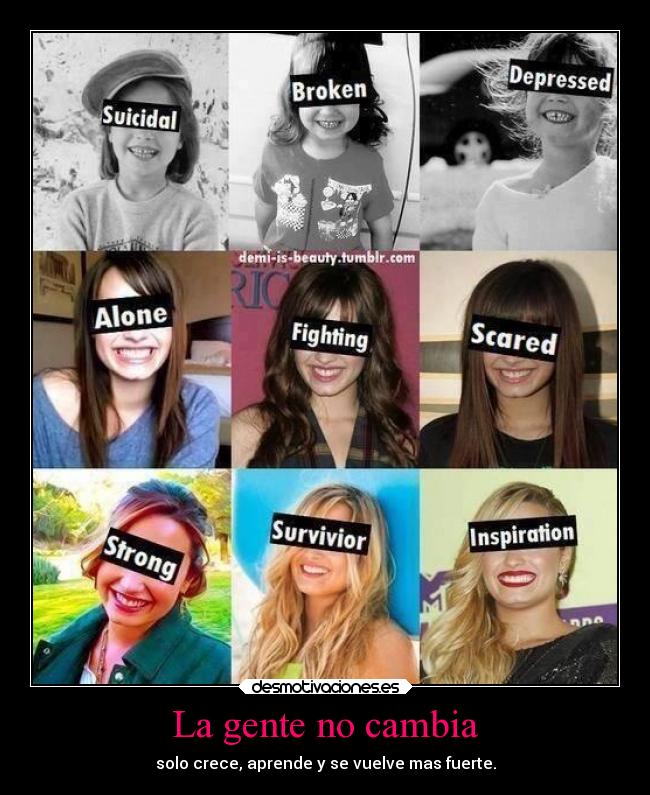 You might find that you are more able to cope in a few days.
You might find that you are more able to cope in a few days.
Look at your crisis plan
Follow your crisis plan if you have one. You may have made a crisis plan with the help of a health professional or made your own.
If you don’t have a crisis plan you could make one. You can start to think of some things which you will find helpful. Keep this plan safe and change it as you need to. There is more information about how to make a crisis plan further down this page.
Look in your crisis box
A crisis box is personal to you and should be filled with items that make you feel happier about life.
If you don’t have a crisis box you can make one. There is more information about crisis boxes further down this page and how to make them.
Be aware of your triggers
Triggers are things which might make you feel worse. Triggers are different for different people. You may find that certain music, photos or films make you feel worse. Try to stay away from these.
You could create a Wellness Action Plan to help you to be more self aware. It can help you to identify triggers in your life which can make you unwell. It may help you to write down your triggers. If you can understand what your triggers are, it can help you to be more in control of your feelings or stress levels.
You can share your Wellness Action Plan with your family or friends if you want to. Sometimes it is helpful to share with your family and friends because it can help them to understand you more.
Click the below link to see an example of a Wellness Action Plan.
www.webstore.cwp.nhs.uk/publications/WRAP.pdf
Stay away from drugs and alcohol
Alcohol affects the parts of your brain that controls judgement, concentration, behaviour and emotions. Drinking alcohol might make you more likely to act on suicidal thoughts.
Drugs affect the way you think and feel. Different drugs have different effects. For example, cocaine can make you feel happy and more likely to take risks when you take it.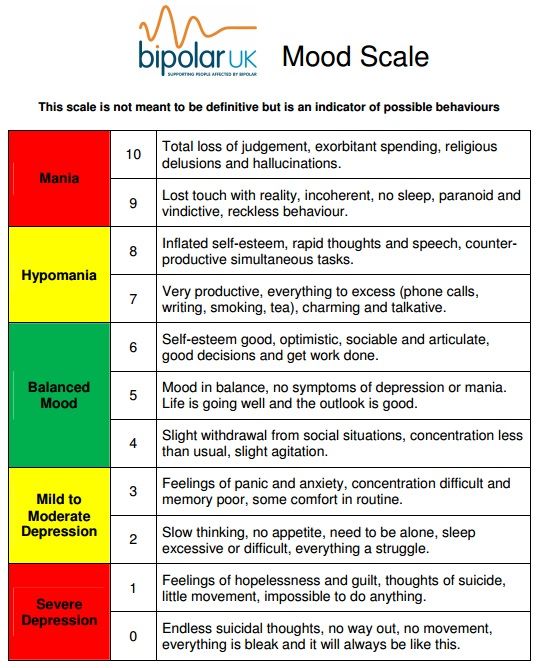 But you may feel depressed after the effects stop. Other drugs can cause hallucinations, confusion and paranoia. You may be more likely to take your own life if you take illegal drugs.
But you may feel depressed after the effects stop. Other drugs can cause hallucinations, confusion and paranoia. You may be more likely to take your own life if you take illegal drugs.
Go to a safe place
Go to a place where you feel safe. Below is a list of places you could try.
- Your bedroom
- Mental health or spiritual centre
- Crisis centre
- Friend’s house
- Library
Stay away from things you could use to harm yourself, such as razor blades or pills. If you have a lot of medication you can ask someone to keep it for you until you are back in control of your feelings.
Talk to other people
It could be helpful for you to talk to someone about how you’re feeling. There are different people who can help. You could speak to friends, family or your GP.
Remember to be patient. Your friends and family may want to help but might not know how to straight away. If this happens, you should tell them what you want from them. You may want to talk about how you’re feeling, or you may want them to help you get professional help.
You may want to talk about how you’re feeling, or you may want them to help you get professional help.
If you don’t want to talk to people you know, you could call an emotional support line, use an emotional support app or use an online support group.
You can find details or emotional support lines and apps in the 'Useful Contacts' at the bottom of this page.
Be around other people
You may find it too difficult to speak to anyone at the moment. That’s ok. But try not to spend too much time alone. You could go to a shopping centre, gym, coffee shop or park. Being around people can help to keep you safe, even if they don’t know how you’re feeling.
Distract yourself
You might feel it is impossible not to focus on your suicidal thoughts or why you feel that way. If you focus on your thoughts it might make them feel stronger and harder to cope with. Try doing things that distract you. Think about what you enjoy doing.
Below are some things you could do as a distraction.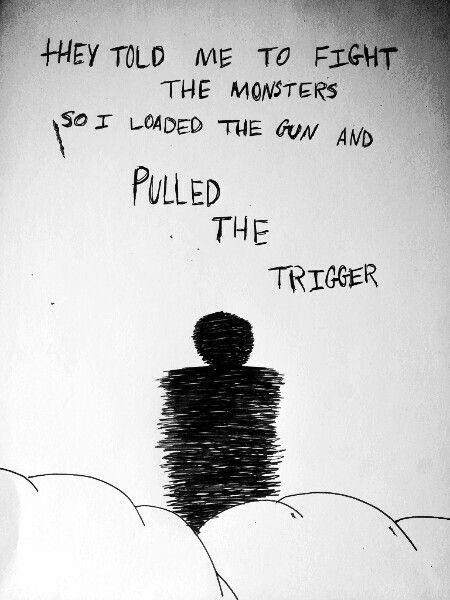
- Read a book or magazine.
- Watch a film or TV.
- Go to a museum.
- Draw or paint.
- Listen to music.
- Play video games. Or other games or puzzles you enjoy.
- Singing
- Spend time with your pet.
- Set small goals to focus on. You could do the laundry, make a cake or tidy or organise something.
Make a list
Make a list of all the positive things about yourself and your life. It might be hard to think of these things right now, but try. Think about your strengths and positive things other people have said about you. At the end of every day write down one thing you felt good about, something you did, or something someone did for you.
Exercise
Exercise can have a good effect on your mood and thinking. Exercise is thought to release dopamine and serotonin. These are ‘feel good’ hormones.
Relax
There are different things you could do to relax such as:
- walk in a green space like a park,
- listen to nature,
- pay attention to nice smells such as coffee shops, your favourite food, a favourite perfume or soap,
- treat yourself to a food you like and pay close attention to how it tastes, how it feels in your mouth and what you like about it, having a bath or shower,
- looking at images that you like, such as photographs,
- meditation or mindfulness,
- breathing techniques or guided meditation.
 You can find these through a podcast or an online video website such as YouTube.
You can find these through a podcast or an online video website such as YouTube.
Mindfulness is a type of meditation. It is when you focus on your mind and body. It is a way of paying attention to the present moment. When you practice mindfulness, you learn to be more aware of your thoughts and feelings. Once you are more aware of your thoughts and feelings, you can learn to deal with them better.
But some people find that using mediation or mindfulness makes their suicidal thoughts worse. If this happens then stop.
You can try a breathing exercise to relax, like the one below.
Breathing exercise for you to try
Sit on a chair or on the floor. Keep your back straight and your shoulders back. Close your eyes and focus on your breathing. Think about how your breathing feels. Slow down your breathing as much as you can. You may find it useful to count as you inhale and exhale. If you start to have upsetting thoughts, bring your focus back to your breathing.
Think about the people you will be leaving behind
You may be thinking thoughts such as the following:
- ‘The world would be a better place without me.’
- ‘My family would be better without me.’
- ‘No one would care if I’m not here.’
These thoughts are common, but not correct. You matter.
Choosing to end your life is likely to have a negative effect on those around you. Even if you don’t think it will. This may be friends, family, neighbours or it may be a healthcare professional such as a doctor or support worker.
You can find more information about ‘Complementary and alternative treatments’ by clicking here.
Emotional support
How can I get emotional support?
Remember that however you feel there are people who will listen and who want to help.
Let family or friends know what you are going through. They may be able to offer support and help keep you safe. They may not be able to make you feel better straight away. But tell them how you feel. They may help you see your situation in a different way or think of other options.
But tell them how you feel. They may help you see your situation in a different way or think of other options.
If you can’t talk to family or friends, you may be able to get emotional support from other places. You could talk to:
- someone from an emotional support line,
- therapist or counsellor
- teacher, tutor or colleague
- religious or spiritual leader
There is a list of emotional support lines in the 'Useful Contacts' section at the bottom of this page.
Professional support
How can I get professional support?
Emergency services and Accident and Emergency (A&E)
If you feel you will take your own life call the emergency services on 999. Ask for an ambulance. Or go to Accident and Emergency (A&E) at your local hospital.
NHS 111
NHS 111 service can help people when it isn’t an emergency. You can call them if you do not have a GP or you do not know who to call. Dial 111 on your phone, it is free. This line is open 24 hours a day 7 days a week.
Dial 111 on your phone, it is free. This line is open 24 hours a day 7 days a week.
Your GP
Your GP might be able to help you get support in a crisis. A GP should be available to speak to you 24 hours a day. If you call your surgery when it’s closed there will be a message to tell you who to call.
Your GP can discuss hospital treatment or refer you to the crisis team. They should do this if you suffer with depression and are a high risk of suicide, self-harm or neglect.
Crisis team or home treatment team
If you are supported by a crisis team, call them. The crisis team are sometimes called the home treatment team.
In some areas you can call the crisis team without a referral from a professional. You can search for your local crisis team online.
Community Mental Health Team (CMHT)
If you are under a Community Mental Health Team (CMHT) call your nurse (CPN) or care coordinator. If they are not there, talk to whoever is on duty that day.
In some areas you can call the CMHT without a referral from a professional. You can search for your local CMHT online.
Recovery or crisis house
A recovery house may be able to help if you are in crisis. A recovery house is a place you would stay whilst you are in crisis. Some recovery houses let you stay for a few days. Some let you stay for a few weeks. It is not a hospital but there will be healthcare professionals onsite.
Usually your GP or other healthcare professional will have to refer you.
There may not be a recovery house in your area. You can check with your crisis team, CMHT or search online to see what is available in your local area.
Charities
Some charities offer emotional support services or support groups. They help by listening to someone’s concerns and giving them space and time to talk through how they feel. Emotional support services are not the same as counselling services.
You can find details of emotional support services in the 'Useful Contacts' section at the bottom of this page.
Rethink Mental Illness have support groups in some areas. You can find out what is available in your area by clicking here.
Or call our General Enquiries team on 0121 522 7007 and ask them for details of local rethink services.
You can find support groups by doing an online search or contacting national mental health charities such as:
- Mind
- Richmond Fellowship
- Together
- Turning point
Crisis plan & crisis box
How do I make a crisis plan or crisis box?
Crisis plan
A crisis plan is sometimes called a safety plan. A plan should be made before you are in crisis, but it is never too late to start. You may need someone to help you to make a crisis plan such as a friend or support worker.
The aim of a crisis plan is to think about what support you need when you are in crisis. You could make a list of things that you could do to help yourself.
You can write down the names and numbers of people who would be able to help you.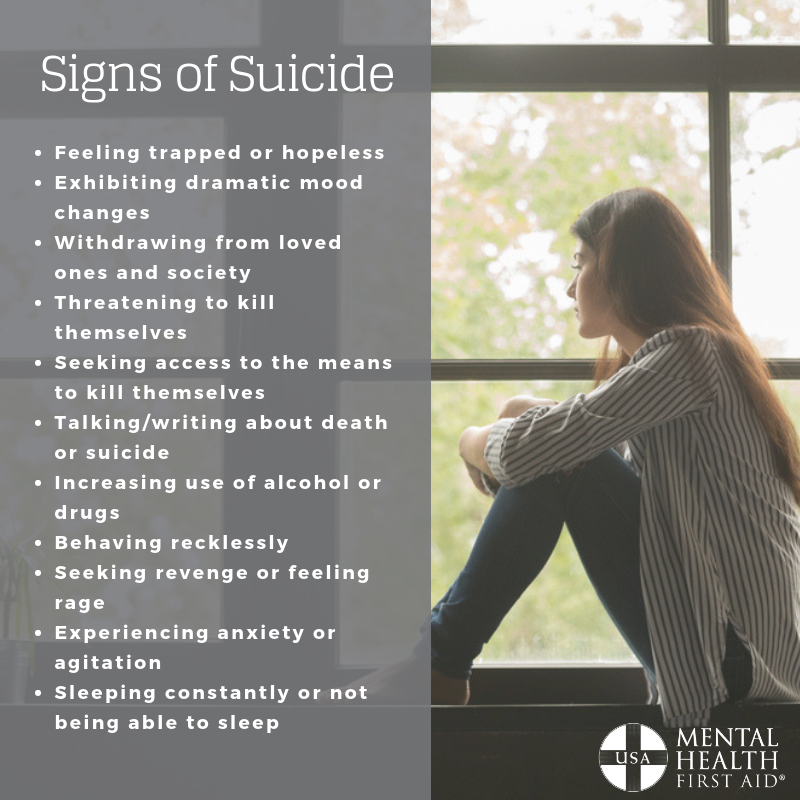 You may find it helpful to include the good things in your life or things that you are looking forward to as part of the plan.
You may find it helpful to include the good things in your life or things that you are looking forward to as part of the plan.
There is no set way for how a crisis plan should look. You can access our crisis plan template by downloading this factsheet using the link at the top of the page.
Crisis box
A crisis box has lots of different names such as a ‘happy box’ or ‘hope box.’ You can call it whatever you like. The idea of a crisis box is that it is filled with items that make you feel better. You can use it when you feel anxious, stressed or suicidal.
The crisis box is personal to you. You can fill it with anything, such as:
- your favourite CD,
- something to distract you, like a puzzle or colouring book,
- reminders of positive things you have learnt in therapy sessions,
- a copy of your crisis plan,
- photographs of people you love and who make you happy, or
- your favourite sweets.
If you don’t know what to put in your box you can look on line for ideas.
The charity Papyrus has more information about crisis boxes. Click the below link for more information:
www.papyrus-uk.org/wp-content/uploads/2018/09/HOPEBOX-resource.pd
Further Reading
Mary Ellen Copeland, PhD. Wellness Recovery Action Plan (WRAP) Plus. Formerly living without Depression and Manic Depression. Dummerston, Vermont: Peach Press; 2010.
Useful Contacts
Samaritans
A charity that offers emotional support for people who are distressed. Local branches offer telephone support and sometimes face to face support.
Telephone: 116 123 (24 hours a day, 7 days a week)
Address: Chris, Freepost RSRB-KKBY-CYJK, PO Box 9090, Stirling, FK8 2SA
Email: [email protected]
Website: www.samaritans.org
ASSISTline
National helpline offering supportive listening service to anyone throughout the UK with thoughts of suicide or thoughts of self-harm. They are open 24/7 for those aged 18 or over.
They are open 24/7 for those aged 18 or over.
Telephone: 0800 689 5652
Website: www.spbristol.org/assistline
Sane
Work with anyone affected by mental illness, including families, friends and carers. Their helpline is open between 4:30pm and 10.30pm every day of the year. They also provide a free text-based support service called Textcare. And an online supportive forum community where anyone can share their experiences of mental health.
Telephone: Because of the COVID pandemic the usual number of 0300 304 7000 isn’t in operation. But you can call 07984 967 708 and leave a message and someone will get back to you. The Support Forum, Textcare and other services are operating as normal.
Textcare: www.sane.org.uk/what_we_do/support/textcare
Support Forum: www.sane.org.uk/what_we_do/support/supportforum
Website: www.sane.org.uk
Shout
A charity that provides support if you’re experiencing a personal crisis and are unable to cope.
Text: text shout to 85258
SupportLine
Support line offers confidential emotional support by telephone, email and post.
Telephone: 01708 765200 (hours vary, ring them for details)
Address: SupportLine, PO Box 2860, Romford, Essex RM7 1JA
E-mail: [email protected]
Website: www.supportline.org.uk/
PAPYRUS
Charity that offers emotional support to people under 35 who are suicidal. They can also support people who are concerned about someone under 35 who might be suicidal. Their helpline is open 9am – midnight every day of the year (weekends and Bank Holidays included).
Telephone: 0800 068 41 41
Text: 07786 209697
Email: [email protected]
Website: www.papyrus-uk.org
C.A.L.M. (Campaign Against Living Miserably)
CALM is leading a movement against suicide. They offer accredited confidential, anonymous and free support, information and signposting to people anywhere in the UK through their helpline and webchat service. Their helpline is open between 5pm and midnight every day of the year.
They offer accredited confidential, anonymous and free support, information and signposting to people anywhere in the UK through their helpline and webchat service. Their helpline is open between 5pm and midnight every day of the year.
Telephone: 0800 58 58 58
Webchat: www.thecalmzone.net/help/webchat/
Website: www.thecalmzone.net
Switchboard
Switchboard gives practical and emotional support for people in the LGBT+ community.
Telephone: 0300 330 0630 (10am – 10pm every day)
E-mail: [email protected]
Webchat: through the website
Website: www.switchboard.lgbt
The Mix
If you’re under 25 and need help but don’t know where to turn, call the Mix for free. They’ll explore your situation with you and find organisations that may be able to help you further. Phones are open 7 days a week from 3pm to 12am. You can also webchat to them 7 days a week from 3pm to 12am, however chats may not be connected after 11:15pm.
You can also webchat to them 7 days a week from 3pm to 12am, however chats may not be connected after 11:15pm.
Telephone: 0808 808 4994
Crisis support: text THEMIX to 85258 for crisis support (24 hours a day, every day) - www.themix.org.uk/get-support/speak-to-our-team/crisis-messenger
E-mail: www.themix.org.uk/get-support/speak-to-our-team/email-us
Telephone Counselling: www.themix.org.uk/get-support/speak-to-our-team/the-mix-counselling-service
Webchat: 1 to 1 chat service - www.themix.org.uk/get-support/speak-to-our-team
Website: www.themix.org.uk
NAPAC
Support adult survivors of childhood abuse.
Telephone: 0808 801 0331. (Monday – Thursday 10am – 9pm and Friday 10am – 6pm)
E-mail: through the website. www.napac.org.uk/contact/
Address: NAPAC, CAN Mezzanine, 7-14 Great Dover St, London, SE1 4YR
Website: www. napac.org.uk
napac.org.uk
Combat Stress
Charity who offer support to ex-service men and women who are experiencing problems with their mental health. And their families.
Telephone for veterans and their families: 0800 138 1619. Open 24 hours everyday.
Telephone for serving personnel and their families: 0800 323 4444. Open 24 hours everyday,
Helpline text:07537 404719
Address: Tyrwhitt House, Oaklawn Road, Leatherhead, Surrey, KT22 0BX
Email: [email protected]
Website: www.combatstress.org.uk
Apps
Stay Alive: Health and fitness App - free
The Stay Alive app is a suicide prevention resource for the UK. It has useful information and tools to help you stay safe in crisis. You can use it if you are having thoughts of suicide. Orif you are concerned about someone else who may be considering suicide.
Website: www. preventsuicide.org.uk/stay_alive_suicide_prevention_mobile_phone_application.html
preventsuicide.org.uk/stay_alive_suicide_prevention_mobile_phone_application.html
Headspace
Headspace is designed to help you to manage your mental health. You can access the app for free, you will have access to basic packages. You will have to pay a subscription to access more content.
E-mail: [email protected]
Website: www.headspace.com
Smiling Mind
Free meditation app.
Website: www.smilingmind.com.au
Residential support
Maytree
Maytree is a national registered charity based in London. They provide a unique residential service for people in suicidal crisis so they can talk about their suicidal thoughts and behaviour. They offer a free 4 night, 5 day, one-off stay to adults over the age of 18 from across the UK. Their aim is to provide a safe, confidential, non-medical environment for their guests.
Telephone: 020 7263 7070
Address: 72 Moray Road, Finsbury Park, London, N4 3LG
Email: maytree@maytree. org.uk
org.uk
Website: www.maytree.org.uk
Need more advice?
If you need more advice or information you can contact our Advice and Information Service.
Contact us Contact us
Suicide prevention | Office on Women's Health
Are you having thoughts about hurting yourself or someone else? Get help right away. If you're in a life-threatening situation, call 911. Getting help for mental health conditions can help prevent suicide.
I’m having suicidal thoughts. What should I do?
- Call 911. Suicidal thoughts are an emergency.
- Call 1-800-273-TALK (8255).
- Go to the emergency room.
- Tell someone who can help you find help right away.
- Stay away from things that might hurt you, like guns, medicines, or dangerous places.

You can also visit our section on mental health conditions. For each condition, you’ll find a list of resources to help you find the support you need. These feelings can and will go away. Talk to a health professional. You are not alone!
What should I say if someone threatens to commit suicide?
If you know someone who is at immediate risk of suicide, call 911 right away. Someone who wants to kill herself should see a doctor, nurse, or mental health professional right away.
If you know someone who might be suicidal, show that you care by:
- Talking to the person. Your willingness to talk about thoughts of suicide with a friend, family member, or co-worker can be the first step in getting her help and preventing suicide. You won’t increase the risk of someone dying by suicide by talking to her about your concerns.
- Sincerely listening to the person. Do not offer advice or judgment, but let her know she is not alone.
 Don’t worry about saying the exact, correct thing. Your presence in the person’s life is what is most helpful.
Don’t worry about saying the exact, correct thing. Your presence in the person’s life is what is most helpful. - Sharing your concerns. If you feel that she may make a reckless decision, say that you are worried. The person needs to know that she is important to you and that you care.
- Finding out if the person has a suicide plan. If the person has a definite plan, don’t leave her alone, and get help from other friends or family.
- Offering help to find a professional counselor. Many counselors or therapists can see a new patient in an emergency. A person’s insurance plan, doctor, or nurse may be able to recommend someone right away.
- Calling the National Suicide Prevention Lifeline, 1-800-273-TALK (8255)
It can be difficult when a loved one says she is thinking about suicide. All you can do is be supportive and let her know you care. You cannot control or change someone else’s behavior, no matter how much you love her.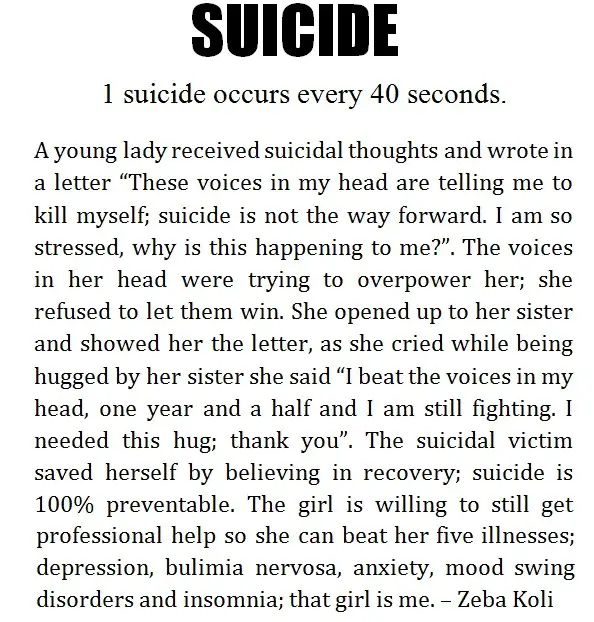 If a loved one commits suicide, it is not your fault.
If a loved one commits suicide, it is not your fault.
What are the warning signs of suicide?
People who consider suicide often feel like there is no hope. They may often feel sad, lonely, trapped, or alone. Some people who have survived suicide attempts have said that these feelings go away and do not last forever.
The main warning signs of suicide include:
- Thinking or talking about suicide
- Misusing substances like drugs or alcohol
- Feeling no sense of purpose or belonging
- Anger
- Feeling trapped (feeling like there is no way out)
- Hopelessness (feeling there is nothing to live for)
- Withdrawal (from family, friends, work, school, activities, or hobbies)
- Anxiety (restlessness, irritability, or agitation)
- Recklessness (high risk-taking behavior)
- Severe mood swings or highs and lows
Other warning signs of suicide include:
- Looking for ways to die (e.g.
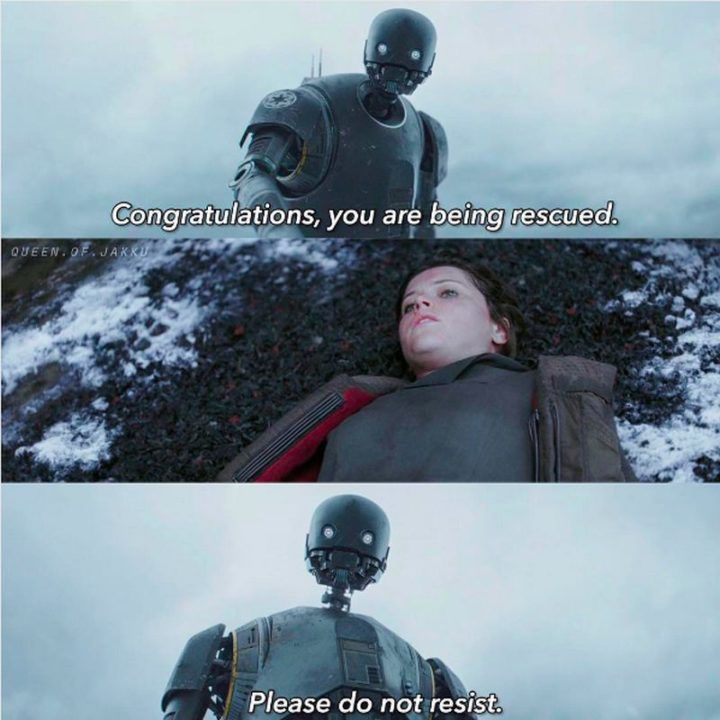 , internet searches for how to commit suicide; looking for guns or pills)
, internet searches for how to commit suicide; looking for guns or pills) - Talking about hopelessness, helplessness, or worthlessness
- Thinking about death a lot
- Suddenly acting happier or calmer after showing other suicide warning signs
- Loss of interest in things they used to care about (e.g., hobbies, relationships, work, school)
- Visiting or calling loved ones and saying goodbye, especially after a long absence
- Making arrangements or putting their affairs in order
- Giving things away, such as prized possessions
A suicidal person needs to see a doctor or mental health professional right away.
What puts someone at risk of suicide?
Some things that increase a woman’s risk of suicide include:
- Depression and other mental health conditions or a substance use disorder. More than 9 in 10 people who die by suicide have a mental health condition or substance abuse problem.1
- A prior suicide attempt
- A family history of mental disorders or substance abuse
- A family history of suicide
- Recent divorce or loss of a spouse or partner2
- Eating disorders3
- Sexual orientation.
 Research suggests that lesbians and bisexual women are at higher risk of suicide than heterosexual women are.4
Research suggests that lesbians and bisexual women are at higher risk of suicide than heterosexual women are.4 - Family violence, including physical or sexual abuse
- Firearms in the home
- Exposure to suicide by other people, including family members, friends, co-workers, or media figures
- Lack of social connection5
Did we answer your question about suicide prevention?
For more information about suicide prevention, call the OWH Helpline at 1-800-994-9662 or check out the following resources from other organizations:
- National Suicide Prevention Lifeline: After an Attempt — A Guide for Taking Care of Your Family Member After Treatment in the Emergency Department (PDF, 352 KB) — Brochure from the Substance Abuse and Mental Health Services Administration.
- Older Adults and Depression — Information from the National Institute of Mental Health (NIMH).
- Suicide — Fact sheet from NIMH.
- Suicide Myths — Information from Suicide.
 org.
org. - Suicide Prevention — Information from SAMHSA.
Sources
- Substance Abuse and Mental Health Services Administration (SAMHSA) Center for Substance Abuse Treatment. (2008). Substance Abuse and Suicide Prevention: Evidence & Implications—A White Paper. DHHS Pub. No. SMA-08-4352. Rockville, MD: SAMHSA.
- Vörös, V., Osváth, P., Fekete, S. (2004). [Gender differences in suicidal behavior]. Neuropsychopharmacologia Hungarica; 6(2): 65–71.
- Pisetsky, E.M., Thornton, L.M., Lichtenstein, P., Pedersen, N.L., Bulik, C.M. (2013). Suicide attempts in women with eating disorders. Journal of Abnormal Psychology; 122(4): 1042–1056.
- Cochran, S.D., Mays, V.M. (2015). Mortality Risks Among Persons Reporting Same-Sex Sexual Partners: Evidence From the 2008 General Social Survey-National Death Index Data Set. American Journal of Public Health; 105(2): 358–364.
- Tsai, A.C., Lucas, M., Kawachi, I. (2015). Association between social integration and suicide among women in the United States.
 JAMA Psychiatry; 72(10): 987–993.
JAMA Psychiatry; 72(10): 987–993.
All material contained on these pages are free of copyright restrictions and maybe copied, reproduced, or duplicated without permission of the Office on Women’s Health in the U.S. Department of Health and Human Services. Citation of the source is appreciated.
Page last updated: February 17, 2021
Get help & support for suicide
If you’re in emotional distress or suicidal crisis, find help in your area with Find a helpline.
If you believe that someone else is in danger of suicide and you have their contact information, contact your local law enforcement for immediate help. You can also encourage the person to contact a suicide prevention hotline using the information above.
Learn more about personal crisis information with Google Search.
Google’s crisis information comes from high-quality websites, partnerships, medical professionals, and search results.
Important: Partnerships vary by country and region.
| Country | Hotline organization | Website | Phone number |
|---|---|---|---|
| Argentina | Centro de Asistencia al Suicida | www.asistenciaalsuicida.org | (011) 5275-1135 |
| Australia | Lifeline Australia | www.lifeline.org | 13 11 14 |
| Austria | Telefon Seelsorge Osterreich | www.telefonseelsorge.at | 142 |
| Belgium | Center de Prevention du Suicide | www.preventionsuicide.be | 0800 32 123 |
| Belgium | CHS Helpline | www.chsbelgium.org | 02 648 40 14 |
| Belgium | Zelfmoord 1813 | www. zelfmoord1813.be zelfmoord1813.be | 1813 |
| Brazil | Centro de Valorização da Vida | www.cvv.org | 188 |
| Canada | Crisis Services Canada | crisisservicescanada.ca | 833-456-4566 |
| Chile | Ministry of Health of Chile | www.hospitaldigital.gob | 6003607777 |
| China | Beijing Suicide Research and Prevention Center | www.crisis.org | 800-810-1117 |
| Costa Rica | Colegio de Profesionales en Psicologia de Costa Rica | psicologiacr.com/aqui-estoy | 2272-3774 |
| France | SOS Amitié | www.sos-amitie.org | 09 72 39 40 50 |
| Germany | Telefon Seelsorge Deutschland | www. telefonseelsorge.de telefonseelsorge.de | 0800 1110111 |
| Hong Kong | Suicide Prevention Services | www.sps.org | 2382 0000 |
| India | iCall Helpline | icallhelpline.org | 9152987821 |
| Ireland | Samaritans Ireland | www.samaritans.org/how-we-can-help | 116 123 |
| Israel | [Eran] ער"ן | www.eran.org | 1201 |
| Italy | Samaritans Onlus | www.samaritansonlus.org | 06 77208977 |
| Japan | Ministry of Education, Culture, Sports, Science and Technology | www.mext.go.jp | 81-0120-0-78310 |
| Japan | Ministry of Health, Labor and Welfare of Japan | www. mhlw.go mhlw.go | 0570-064-556 |
| Malaysia | Befrienders KL | www.befrienders.org | 03-76272929 |
| Netherlands | 113Online | www.113.nl | 0800-0113 |
| New Zealand | Lifeline Aotearoa Incorporated | www.lifeline.org | 0800 543 354 |
| Norway | Mental Helse | mentalhelse.no | 116 123 |
| Pakistan | Umang Pakistan | www.umang.com.pk/ | 0311-7786264 |
| Peru | Linea 113 Salud | www.gob.pe/555-recibir-informacion-y-orientacion-en-salud | 113 |
| Philippines | Department of Health - Republic of the Philippines | doh. gov.ph/NCMH-Crisis-Hotline gov.ph/NCMH-Crisis-Hotline | 0966-351-4518 |
| Portugal | SOS Voz Amiga | www.sosvozamiga.org | 213 544 545 963 524 660 912 802 669 |
| Russia | Fund to Support Children in Difficult Life Situations | www.ya-parent.ru | 8-800-2000-122 |
| Singapore | Samaritans of Singapore | www.sos.org | 1-767 |
| South Africa | South African Depression and Anxiety Group | www.sadag.org | 0800 567 567 |
| South Korea | Korea Suicide Prevention Center중앙자살예방센터 | www.spckorea.or | 1393 |
| Spain | Telefono de la Esperanza | www.telefonodelaesperanza. org org | 717 003 717 |
| Switzerland | Die Dargebotene Hand | www.143.ch | 143 |
| Taiwan | 国际生命线台湾总会 [International Lifeline Taiwan Association] | www.life1995.org | 1995 |
| Ukraine | Lifeline Ukraine | lifelineukraine.com | 7333 |
| United Kingdom | Samaritans | www.samaritans.org/how-we-can-help | 116 123 |
| United States | 988 Suicide & Crisis Lifeline | 988lifeline.org | 988 |
How can we improve it?
Ask the Help Community
Get answers from community expertsTransfers
home
Parents
Helpline
Information about the unified all-Russian children’s helpline
0446 8-800-2000-122 .
When calling this number in any locality of the Russian Federation from fixed or mobile phones, children in difficult life situations, adolescents and their parents, other citizens can receive emergency psychological assistance, which is provided by specialists of services already operating in the constituent entities of the Russian Federation that provide services for telephone counseling and connected to a single all-Russian number of children's helpline.
Confidentiality and free of charge are the two main principles of the children's helpline. This means that every child and parent can anonymously and free of charge receive psychological assistance and the secrecy of his call to the helpline is guaranteed.
Working hours of the children's helpline in the constituent entities of the Russian Federation
(as of October 1, 2013)
| Name of the subject of the Russian Federation 9Arkhangelsk region 09. | |||
| 22 | with Nenets Autonomous Okrug | daily 09.00-17.30 | |
| 23 | Vologda region | around the clock | |
| 24 | Kaliningrad region | daily0039 | around the clock |
| 35 | Chechen Republic 08.30-20.00 | ||
| South Federal District | |||
| 37 | Republic of Adygea | ||
| Kalmykia | Pon-Pip. 8.00-17.00 | ||
| 3 | |||
| 80 | Magadan region | Pon.-Pon. 10.00.22.00 | |
| 81 | Sakhalin Region | ||
| 900 | |||
| 83 | Chukotka AO | Mon-Fri 09.00-22.00, closed 16.00-22.00 | |
Infographics. The principle of operation of a single federal helpline number for children, adolescents and their parents
Information from the regions about the work of the children's helpline
12/28/2016
What to do when there is a problem, but there is no one to tell about it?
12/28/2016
Online psychologists are ready to save children from bullying
12/28/2016
What problems do residents of the Irkutsk region call the helpline
09.